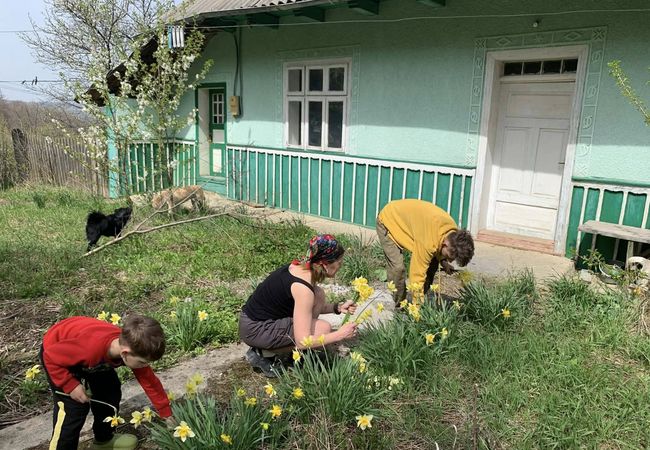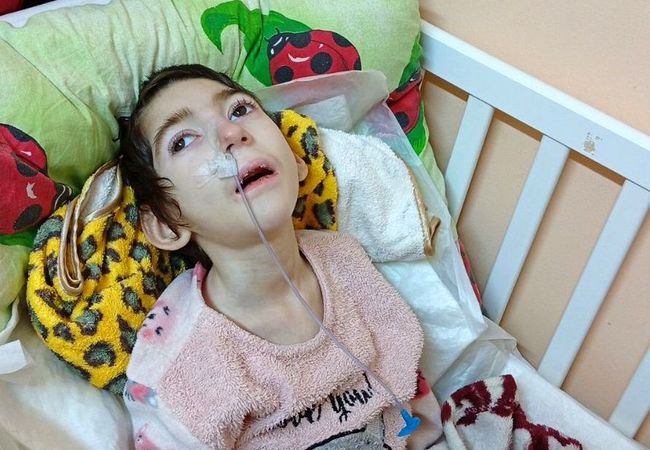DEBALTSEVE, Ukraine, 4 June 2015 – In early 2015, the town of Debaltseve, positioned strategically in eastern Ukraine’s Donetsk region, became a locus of conflict. After several weeks of fighting, the town was no longer government-controlled.

© UNICEF Ukraine/2015/Filippov
A the only operating kindergarten in Debaltseve, Ukraine, the playground is bustling with children.
When the hostilities had ended, Ms. Ovcharenko and a specialist from the de facto Ministry of Emergency went from basement to basement, bomb shelter to bomb shelter, searching for small children who had been hiding with their families.
“We even found newborn babies,” she recalls. “We had no idea they were there.”
Kindergarten reopens
Ten days later, 35 children had been offered places at the kindergarten. The building was damaged. Windows had been blown out, inside walls bore marks of shrapnel and paint peeled from the hallway walls from the impact of explosions. But the school was sound enough to open to its young pupils.
The emotional state of the children was of far greater concern.
“It became clear to us that we would not be able to deal with the trauma we saw in the children, even if our staff is very experienced,” Ms. Ovcharenko says.
Visible signs of distress
In March, a mobile team of volunteer psychologists arrived on site to work with the children, one of three such teams operating with UNICEF support in non-government-controlled areas of eastern Ukraine. The teams had recently been set up as part of a programme developed by UNICEF Ukraine child protection specialist Gabrielle Akimova and Director of the Donetsk Republic Educational and Methodological Centre for Psychological Services Inna Ivanova.

© UNICEF Ukraine/2015/Filippov
Many children who have experienced trauma can appear calm, but in an unhealthy way, often sitting silently on their own.
Volunteer psychologist Valentina Nikolaeva recalls her first meeting with the children. “When we first saw the children in March, they had visible signs of trauma. They did not touch others, and they did not want to be touched. They were scared when they heard loud noises.”
“They were very anxious,” adds Irina Emets, another psychologist. “And they were calm, but in an unhealthy way – just sitting silently on their own.”
What happened after the psychologists began group and play therapy with the children, however, was remarkable.
“We saw results in just a week’s time,” says Ms. Ovcharenko. “The children adapted back to normal life, and they laughed again.
“It is something I really would not have expected.”
Colours brighten
Today, in the psychologists’ sessions, the children – who now total 78 – are cheerful and lively. The playground outside is bustling.
The psychologists come three days per week, four or six at a time. Inna Ivanova supervises the psychologists on a weekly basis. The team use a variety of methodologies to assess the condition of the children, she says. For example, children may be asked to select colours to describe their mood.
“As their condition improves, we see that the children select brighter colours,” she observes.
Indeed, the psychologists show examples of what children aged 5–6 have drawn to illustrate joy. The recent drawings show bright colours, rainbows and flowers.
“But children still have a high level of anxiety,” cautions Ms. Nikolaeva, pulling out another set of drawings.

© UNICEF Ukraine/2015/Filippov
UNICEF provides psychosocial support to children at the kindergarten who have been affected by conflict.
“Here, we asked the children to draw a safe place for themselves. One child drew an underground shelter, another a fortress, a third a house that looks ordinary, but has a reinforced roof and tape across the window as blast protection.”
Echoes beyond the school
Psychosocial support is a major component of UNICEF’s emergency response in Ukraine. With funding from the Swedish International Development Agency (SIDA), UNICEF Ukraine has reached more than 11,000 children with psychosocial support, and trained more than 100 teachers and psychologists.
In Debaltseve, since the mobile team began their work, parents have begun to pay more attention to children’s psychosocial well-being. In fact, word has spread of the psychologists’ results. These days, parents from the other end of town are bringing their children around for support.
Some adults have come to seek psychological help, which is not necessarily customary in this country.
The psychologists have begun to note new patterns of behaviour among the adults.
“Their world view is different from how it used to be,” remarks volunteer psychologist Elmira Omelchenko.
________
To date, conflict in Ukraine has affected five million people, including 1.7 million children.



